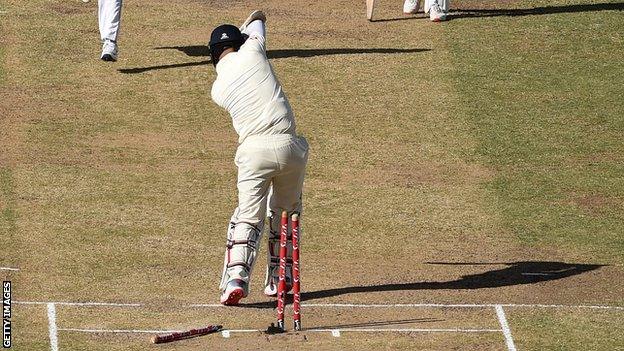England in West Indies: Tourists must rein in positive approach
- Published

Moeen Ali has scores of 0, 0, 60 and 4 in the series
Test cricket should be played over five days. Instead, after yet another England batting collapse, their fans are spending two extra days on the beach in Antigua.
While I am sure they will enjoy the sun, they would much rather be watching England fight to save the second Test against West Indies.
The tourists managed to lose the series after only seven days' cricket, sealed with a 10-wicket thumping at the Sir Vivian Richards Stadium that was every bit as chastening as the 381-run defeat in Bardados.
Once again, West Indies outplayed England. Once again, West Indies offered more threat with the ball. Once again, England subsided with the bat.
The statistics are damning. England were bowled out for 187 and 132 in Antigua. They batted for only 42 overs in the second innings, only six more than West Indies number four Darren Bravo managed on his own.
Four of England's batsmen were bowled, with two - Jonny Bairstow and Moeen Ali - cleaned up attempting booming drives early in their innings.
All but two of England's top nine reached double figures, but Jos Buttler's 24 was the highest score.
England were lacking in application, they were lacking in discipline and they were lacking in bravery on a pitch that was unreliable but far from treacherous. West Indies showed that by batting for 131 overs.
Should we expect anything else from England?
Perhaps it is no surprise. After all, the team is full of middle-order batsmen, who tend to be freer and play more shots than those at the top of the order.
But - and I have said this numerous times in the recent past - you need to be able to adapt in Test cricket.
Sometimes counter-attacking pays off, as it did when England won in Sri Lanka before Christmas. But until they learn to adapt better to situations, they will not succeed on a regular basis.
The irony was that one of the finest defensive players England have had, their record run-scorer Alastair Cook, was sitting next to me in the commentary box as another horror show with the bat unfolded.
Cook retired last summer, but by then he was seen by some as an old-fashioned player whose primary objective was to occupy the crease rather than to entertain.
You do not get many of his type anymore. Indeed, national selector Ed Smith has admitted to me that the cupboard is bare; there are not enough numbers one to three pushing for a place in the England team.
One member of the England management team told me that the best partnership he saw in the County Championship last season was between Warwickshire's Ian Bell and Jonathan Trott, both former England players. Bell is 36 and the now retired Trott 37.
Defensive does not mean negative
What I want to stress is that playing defensively is not negative, boring or dull. It is simply essential.
West Indies won because of the way they defended with the bat. They took the bruises, they gutsed it out - and they won in three days.
England were given an object lesson in how to play by Bravo, who made his reputation as a free-scoring batsman but who spent 215 balls and 340 minutes reaching 50, the third slowest half-century in Test history.
For some reason England seem incapable of playing like that.
Although he did not mention it after this defeat, captain Joe Root's desire to play "bold" cricket has been a hallmark of this team in recent times.
It is also their undoing. The positive approach must be reined in - the needle has gone too far to the right.
If it was one or two players who kept making the same mistakes, I might think otherwise, but it is the whole team. They collapse far too often.
There is something wrong with the team message, which I can only assume is coming from the management group.
Root and coach Trevor Bayliss need to review that 'positive' mantra and get the balance back.
Lots of time, but limited opportunities before Ashes
Although the Ashes against Australia are six months away, England have only two Tests to play before then.
I cannot imagine the personnel will change much in that time, which means they have to get the current players performing much better than they are.
As a team and as individuals, they must figure out how to tackle this problem.
That process begins with the final Test in St Lucia. Although the obvious priority is to avoid a 3-0 series whitewash, I want to see evidence that England have learned from what has happened on this tour.
Can the batsmen go out with an open mind and play for the situation? Can they adopt an all-round game to suit the conditions, rather than simply hitting their way out of trouble?
We will soon find out.
Jonathan Agnew was speaking to BBC Sport's Justin Goulding.